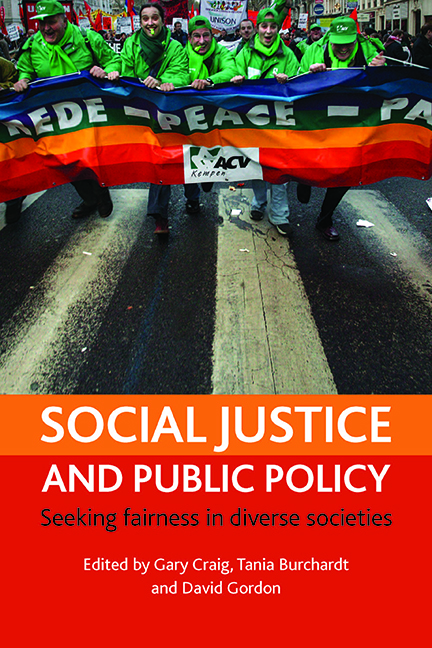Book contents
- Frontmatter
- Dedication
- Contents
- Acknowledgements
- Notes on contributors
- Introduction
- one Social justice and public policy: a view from political philosophy
- two Social justice and public policy: a social policy perspective
- three Multiculturalism, social justice and the welfare state
- four Structural injustice and the politics of difference
- five Recognition and voice: the challenge for social justice
- six Globalisation, social justice and the politics of aid
- seven Social justice and the family
- eight Children, policy and social justice
- nine Social justice in the UK: one route or four?
- ten Monitoring inequality: putting the capability approach to work
- eleven The limits of compromise? Social justice, ‘race’ and multiculturalism
- twelve Understanding environmental justice: making the connection between sustainable development and social justice
ten - Monitoring inequality: putting the capability approach to work
Published online by Cambridge University Press: 19 January 2022
- Frontmatter
- Dedication
- Contents
- Acknowledgements
- Notes on contributors
- Introduction
- one Social justice and public policy: a view from political philosophy
- two Social justice and public policy: a social policy perspective
- three Multiculturalism, social justice and the welfare state
- four Structural injustice and the politics of difference
- five Recognition and voice: the challenge for social justice
- six Globalisation, social justice and the politics of aid
- seven Social justice and the family
- eight Children, policy and social justice
- nine Social justice in the UK: one route or four?
- ten Monitoring inequality: putting the capability approach to work
- eleven The limits of compromise? Social justice, ‘race’ and multiculturalism
- twelve Understanding environmental justice: making the connection between sustainable development and social justice
Summary
Introduction
The capability approach offers an account of equality based on the distribution of substantive freedom. It has been developed by Amartya Sen and, in a somewhat different version, by Martha Nussbaum, over a period of several decades. The approach has been used extensively in international development, most notably in the United Nations Human Development Index, but until recently has rarely been applied to policy or analysis in the global North. Indeed, one of the recurring complaints about the approach is that, while it may be attractive in theory, it is unworkable in practice other than in a crude form. This chapter presents a case study of its application to monitoring inequality in Britain, offering an analysis of the difficulties encountered in translating the theory into a measurement framework and proposing some ways forward.
The context for this study was the creation of the Equality and Human Rights Commission, which in October 2007 took up statutory powers for monitoring and promoting equality and human rights in Britain. The commission supersedes previous separate commissions for gender, race and disability equality, and takes on new commitments to counter discrimination on grounds of sexual orientation, transgender status, age and religion or belief, as well as a central role in protecting human rights. Like its predecessors, the commission is publicly funded but independent from government.
Partly in order to inform the work of the new commission, the government initiated a review of the state of inequality in Britain, chaired by Trevor Phillips. The Equalities Review reported in February 2007, and recommended, among other things, that an equality measurement framework based on the capability approach be adopted by the new commission, and by other public bodies. This recommendation grew out of work by the steering group on measurement, of which the author of this chapter was a member.
Bringing together responsibility for a range of different strands of equality marks a new departure for Britain, although recent European Union (EU) directives make it more likely that this will become the norm, and indeed a number of other European countries already have similar institutions.
- Type
- Chapter
- Information
- Social Justice and Public PolicySeeking Fairness in Diverse Societies, pp. 205 - 230Publisher: Bristol University PressPrint publication year: 2008
- 1
- Cited by



